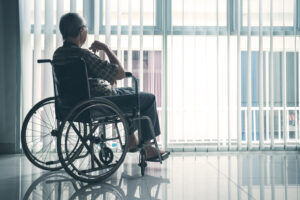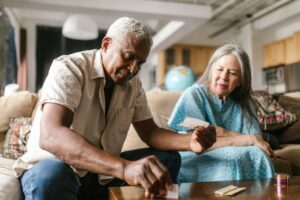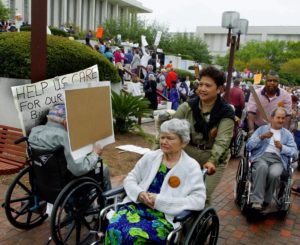Getting Old in the Land of Independence
As a society, and as individuals, we are woefully unprepared for aging, even when it's our parents. About 34 million Americans provide at least some of the care for frail, aging family members, and yet we don't see it as a normal, predictable part of the life cycle.This is probably not the best week to air any reservations about the American passion for independence. After all, we don’t have fireworks for Dependence Day. We don’t hold parades to celebrate Interdependence Day. We don’t get a holiday for Connections.
Our allegiance to independence as a nation is Yankee doodle dandy. But I’m wondering whether our ode to independence as a people is a bit over the top. We foster an unrealistic view of the way we live, not just in the designated years of caring for our children but in the undesignated years when we care for our elders.
Maybe independence is too crisply defined as “exemption from reliance on, or control by, others; direction of one’s own affairs without interference.”
This comes to mind because here in Massachusetts we have had five serious car accidents involving elders in the past month. An 86-year-old struck an elderly man in a crosswalk. A 93-year-old drove through the window of a Wal-Mart, injuring six people. An 89-year-old killed a 4-year-old child.
Yes, I know. An octogenarian may be no greater a menace on the highway than a 35-year-old texting while driving. But the spate of accidents predictably prompted a call to require regular testing of everyone over 85. This in turn prompted one elder in a car-dependent suburb to lament, “It would ruin me. I’m so dependent on it. If I couldn’t drive I’d have to be dependent on someone else.”
Somewhere along the way we have to acknowledge that there are worse things than being dependent. And somewhere we have to wonder why we turn to legislation when we need conversation. Looking to the state to take the keys from Dad is rather like outsourcing our children’s sex education to the schools because we are too tongue-tied to talk about sex at home.
As a society, and as individuals, we are woefully unprepared for aging, even when it’s our parents. We have 76 million baby boomers already entering their 60s. As one of them, Paula Span, says, “When my dad was my age both of his parents had died and he was retired. I’m never going to be able to retire and I might be caring for my dad when I’m in my 70s and he’s in his 90s.”
Span has written “When the Time Comes,” a welcome “support group in print” for anyone with aging parents. She leads a compassionate and eyes-wide-open journey with families struggling to do the right thing from the car-key moment to hospice.
About 34 million Americans provide at least some of the care for frail, aging family members, and yet we don’t see it as a normal, predictable part of the life cycle. As Span says with amazement, “We prepare for everything. We prepare for education, for marriage. We read 40 books on pregnancy and childbirth. But we don’t prepare for the idea that we’ll spend years taking care of an older relative.”
Instead, we retain what she calls “this hazy idea that we’ll all be healthy for years and years and then just die.” There is no best-seller called “What To Expect When They Are Declining.” Nor is there any “Missing Manual” on what to do when our parents become too frail or confused to live alone. It always seems sudden when we get the call about the “accident” or the illness or the pot left on the stove.
The concern around the car keys is a symbol of the denial shared by parents and adult children. But it’s also a template for talking about everything from assisted living to end-of-life care. These are the courageous conversations to initiate before “the time comes.” “Immortality is not on the menu,” says Span, “so let’s dispense with that and talk about what’s going to happen.”
What inhibits us is not just the parent/child relationship but the belief that there is something shameful, improper and infantilizing about “help.”
Our parents raised us to be independent. We raise our children under the same rubric. What we left out is the lesson that caregiving continues through the life cycle. Needing help is not role reversal but joint responsibility. We are bound to break through this reticence when the 76 million boomers start hitting 75.
But all this is hitting this generation as adult children, a phrase that is no longer an oxymoron.
Driving is not all that’s driving this. Sooner, not later, our country has to pass a reality road test on independence.
Ellen Goodman’s e-mail address is ellengoodman1(at)me.com.
© 2009, Washington Post Writers Group
Your support matters…Independent journalism is under threat and overshadowed by heavily funded mainstream media.
You can help level the playing field. Become a member.
Your tax-deductible contribution keeps us digging beneath the headlines to give you thought-provoking, investigative reporting and analysis that unearths what's really happening- without compromise.
Give today to support our courageous, independent journalists.






You need to be a supporter to comment.
There are currently no responses to this article.
Be the first to respond.